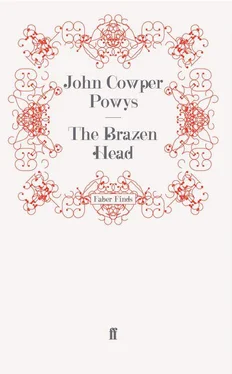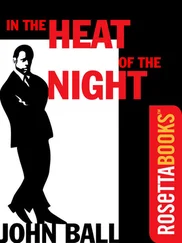At this pathetic self-accusation the Friar quickly opened his eyes.
“No, no!” he cried, “you’ve put new life into me, Miles old friend, by giving me your real and actual feeling about Petrus Peregrinus. But you were beginning to tell me why you thought they were expecting him at the Fortress.”
At this the majestic Roman physiognomy of Miles dissolved into the love-ravaged confusion of a guilty hero-worshipper, and with a convulsive sob he sank on his knees.
“He ate and he drank,” were the words that that crumpled visage now moaned into the edge of the prisoner’s coverlet, “everything I’d brought for both of ye! And then, when he was satisfied, he just went off. He glanced at you before he went and kept muttering to himself without taking any notice of me, “O he’ll come to life in a minute or two! come to life in a minute or two! He’ll come to life in a minute or two!” And off the man went. But I do think I picked up from his randy chat, while I was pegging along by his side and carrying his bundles, that he had been told of your Brazen Head having been taken into the Fortress and put into the armoury; and I think myself, master, that it was with the idea of visiting your Brazen Head that he wanted to get in touch with the lord of the Fortress. At any rate we met young John, and John must have told them to expect him.”
The tone in which Miles uttered this last sentence contained, in its military resonance, a finality which conveyed such an utter removal of all responsibility for what was happening from the recipients of the news it brought, that Roger Bacon, only just hoisted up from the heavenly tide of oblivious sleep, turned over on his bed and closed his eyes.
Petrus Peregrinus had found no difficulty, when once he had descended the stairs, in persuading, by the offer of a sufficient bribe, one of the pleasant-speaking boys from the Prior’s kitchen to lead him to the Fortress. Once inside the Fortress he had no difficulty on that particular evening in obtaining a leisurely and agreeable interview with the Lord of the Manor of Roque.
The Baron’s curiosity in relation to this singular intruder was lively from the first moment he heard the rumours about him, but as soon as he met him face to face on this night of the man’s departure from the Priory, he felt it was imperative that he should have him to himself in private for at least a quarter of an hour.
No! He couldn’t deal with the fellow in the presence of the family. For here was his forever indignant, forever outraged, forever grievanced Lady Val, whom he always thought of in his own mind as “Valentia the Irreconcilable”, and here was his excitable daughter Lil-Umbra, and here was his anxious, concentrated, architectural-minded elder son Tilton, and finally here was the adventurous young John, who of late had become such a fierce champion of Friar Bacon that he had rendered himself as fully liable to ecclesiastical censure as was the Friar’s older friend Raymond, whom Lady Val had already accepted as Lil-Umbra’s betrothed.
Here they were, all the lot of them, gathered together in high spirits after a lively evening meal, and simply waiting for some event of an exciting nature to occur. What could he do to get the fellow entirely to himself for a while? He looked first at one of them and then at another, as they all stood round him while the young man from the Priory, having ushered Master Peter into their presence, made a little speech, as dignified as it was natural, emphasizing the fact that the fame of the Brazen Head, possessed of the power of speaking and perhaps even of the power of thinking was what no doubt had brought this notable visitor.
At last the Lord of the Manor of Roque got an inspiration. And it was Lil-Umbra who gave it to him. The others had already begun to talk among themselves when she spoke up boldly and clearly, addressing her father.
“Better take Maître Pierre de Maricourt”—for the traveller had evidently instructed the boy from the Priory kitchen exactly how to announce him—“upstairs to your little room, Father. And then you’ll be able to tell us better and clearer about him, so that Mother, and we all, can do him the honour which we feel sure he deserves. Tilton and John and I are so keen to know all about him that we might be a bother to him. But with you to explain—” And Lil-Umbra ended with a pathetically beseeching glance at Lady Val, as much as to say, “I’ll be very very good and do everything, yes, everything, you want me to do, if only you’ll agree to this!”
But the Lord of the Fortress was so quick in taking his daughter’s wise hint that Lady Val had no chance to intervene, nor had her brothers a chance to accompany the two of them, even with the politest intentions. For throwing his powerful right arm round the slim, frail, weedy little body of his guest, as if he were his uncle rather than his host, he hurried him upstairs to the “little room” to which Lil-Umbra referred.
This, as a matter of fact, was a small apartment next door to their large bed-chamber, an apartment where the Baron kept the smaller, rarer, daintier, more delicate, more breakable utensils of his hunting, fishing, spearing and arrow-shooting gear.
The Baron himself and Peter of Maricourt in Picardy would have indeed been a perfect subject for a painter in oils, had one such been there to watch them; and indeed the mere sight of them, as they sat facing each other in the Baron’s “Little Room”, might possibly, had Tilton been daring enough and unscrupulous enough to slip up there after them and peep at them through the half-open door, have turned him from a sculptor into a painter.
It was a characteristic of several of the rooms in the Fortress that the doors were so constructed that it was physically impossible for them to be properly shut, so that the young man could have watched them for some time with an interest that might have inspired him with a passion for portrait-painting.
Yes, if the boy had been rude enough to follow them, the effect of the extraordinary vibrations thrown off all the time from the person of Master Peter might have affected this serious-minded young man’s life in a really startling manner.
But Tilton did not follow them into that little room with the door that couldn’t shut. We may imagine his doing so; but he didn’t and that ends it. The chance came. The chance was not taken. The particular sight that, if it had been taken, would have changed his whole life, was never seen by him.
Chroniclers of human history talk of Fate, or Destiny, of what Homer calls “Keer” or doom. But all the time it is the great goddess of Chance — the present chronicler shirks using her name, because to anglicize it we have to turn the Greek letter called “upsilon” into our “Y”, which always tempts us to pronounce it like our “i”, which spoils its beauty altogether — yes, all the time it is the great goddess of Chance who turns the scale at the supreme crises of our life.
But though the sight of their figures facing each other remained unseen, Master Peter of Maricourt in Picardy and the Lord of the Fortress of Roque certainly did not “beat”, as the saying is, “about the bush ”.
“What is that fool of a Friar made of,” queried Master Peter, “that he spends all his time, now that you people have got his Brazen Head, in writing long elaborate criticisms of these miserable doctors in Oxford and Paris, when he must know perfectly well that they are all tarred with the same brush and the same tar, the brush of obstruction and the tar of abstraction?
“And what a simple mind the fellow must have to make these attacks on the stupidity of the great mass of people and on the ignorance of their teachers! What does the man expect of our poor wretched human race? Hasn’t it been the same from the beginning? Can you or anybody else imagine anything different? Jesus Holy! How can the fellow suppose that even the cleverest of our masters with a class of young men before him as simple as our boys are — and they weren’t very different in the days of Confucius or the days of Socrates! — can bring, to what he tells these kids, inspiration and wit and insight enough to start them off looking up words in their Greek and Latin dictionaries?
Читать дальше











